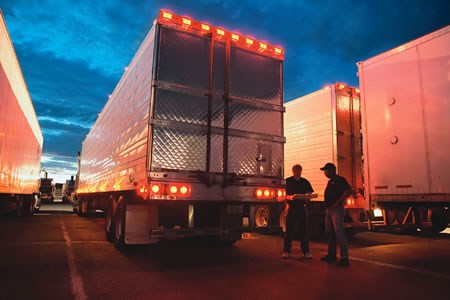Failing to keep abreast of the constant stream of new security-focused trade regulations could stop an importer's shipments in its tracks.
"In today's environment where compliance is the cornerstone of being a good importer, that's what sets us apart", says Wendy Archambault, vice-president of Canadian brokerage services for Livingston International.
As Canada's largest custom brokerage, the Toronto-based company has more than 30,000 clients tapping into their North American shipping expertise in cross-border imports, freight forwarding and supply chain management.
Though large companies prefer to deal with separate customs brokers, freight forwarders and carriers to secure favourable deals and rates, many small and medium-sized businesses prefer to deal with a one-stop shop, says Archambault.
"Clients find it easier to deal with one firm in the hand-off of paperwork and the movement of freight are more seamless than having multiple parties involved in the transaction."
Archambault says her company has developed a niche solution to help SMEs on both ends with a small business group to walk clients through their options.
Instead of hiring a third-party logistics provider, an individual importer can always resort to clearing their own shipments through customs. CBSA has a web portal for small business owners to do that.
However, Archambault says it can be a time-consuming and onerous process. "After the first experience, they realize it's just not worth the savings."
Under the new harmonized system of goods classification, importing one commodity can be a relatively easy process. If there are multiple products arriving, it can fall under the regulations of CBSA plus other government departments as well.
"It can be very tricky in today's environment," says Archambault.
"With the monetary penalty for non-compliance and mis-declaration, it can be pretty costly if you don't do it right."
Archambault says the biggest cost to importers is GST and to a lesser extent, duty. The company's brokerage fees represent less than one per cent of that. Individual business owners need to measure the time and effort to bone up on CBSA rules to do it themselves or letting an expert handle it
Also factored into fees are an importer's volume, dimensions and variety of incoming goods.
Livingston International offers multiple options including basic classification and accounting services to clear shipments through Canada Customs. There's additional fees for software and consulting services.
Archambault says years ago, their fee structure was based on value of goods but "there isn't a lot of duty on goods paid anymore because (much of it) qualifies under NAFTA. The biggest disbursement for most importers these days is the GST.
Often fees are based upon the broker's work performed and the risk associated with the good's value, whether the shipment clears easily in 15 minutes or three hours.
Like most brokerages, Livingston offers web-based solutions for client shipment tracking to view import documents and invoices. Their Pre-Arrival Review System (known as PARS) delivers shipment status at the border, giving both the importer and his carrier first-hand knowledge if a shipment is set up for clearance or if it has been released.
"Dispatchers like that feature," says Archambault.
With Canada Customs pushing the trade community to do more business electronically, Archambault says Livingston is following the trend of other logistics companies in reeling in their border presence. Some providers have closed up border offices entirely, but their Thunder Bay location, north of the Pigeon River Canada-U.S. crossing, still maintains two employees.
"About 98 per cent of our volume with CBSA is done electronically." The border offices act as a "safety net" in case of computer crashes or if drivers are having documentation problems. "But the frequency of that happening is very minimal."




